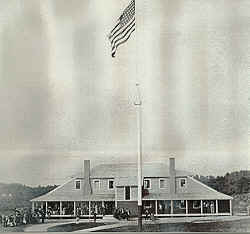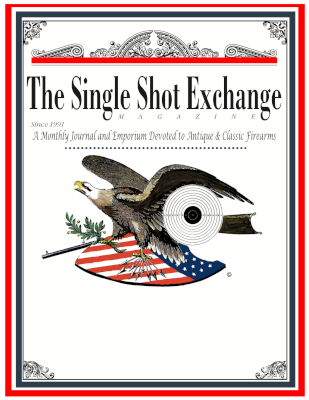Observations on Rifle Shooting
by Joshua Hasbeen of Coxsackie.
From Shooting and Fishing, January 31, 1889 • Vol. 5, No. 14
1. In the first place get a rifle of your own; you can’t do much without one.
2. Get one that don’t require any elevation at 200 yards. There are plenty of them, so I hear.
3. Get one that will place one bullet on top of another at 300 yards. There are some out West.
4. Be sure you get one with the Dr. Spencer improvements.
5. If you own a pair of mules to tote it around and the muscular development of Sampson to hold it up, you can find your size in Newark, N.J., with handles to suit.
6. Be sure you weigh the powder accurately, taking care there is not a fractional part of a grain in one shell more than another. I have known carelessness in this matter causing a difference in elevation at off-hand shooting of 200 yards, of nearly one-fourth of an inch.
7. Don’t trust to factory-made bullets; make them yourself. It is hardly likely the manufacturers know as much about it as you do.

8. Abstain from the use of tea, coffee, beer and tobacco, and practice with light dumb bells 24 times in 24 hours. This will have a tendency to stiffen your nerves in about 90 years.
9. When you get on the range, shoot about 20 times before you begin to score. This will tire out most of the others who are waiting to shoot; it will also warm up your barrel. Then put the stock under your coat; that will warm up the other end, and make a very fine military position. It is hardly likely any of your particular friends will object, even if it is against Creedmoor rules. (Photo shows barrel maker Harry M. Pope, 1935, at the Walnut Hill Rifle Range in Massachusetts.)
10. Always have with you a pad, or something that will answer the purpose, that you can put under your vest or coat, to form a cushion for your arm, when you shoot hip or body rest. This will help amazingly, and no one will be the wiser even if it is not allowed.
11. Practice till you get a bull, then hand in your score card quickly, and inform the scorer that you have commenced. There is nothing like a good send off, as you may not tally on the end.
12. Make some excuse every time you get off of the bull. That will cause you to feel relieved even if no one believes you.
13. Keep moving your sights every time you shoot. Something must be wrong if you don’t get in the middle of the bull.
14. If you fail to score a ten at every shot, send for another gun. In this way, after a while, you may be able to accomplish your object, whether you hold on or not.
15. Always shoot from a shed when on your home range; there is no wind or sun there, and if you say nothing about it you will get a record along side of those that shoot in all kinds of wind and weather. This is quite important. They usually do this in the army, when they can, while in actual hostilities.
16. Choose a slab target when you can; one joined together in the middle. If the signal don’t show up you can challenge the shot, go up to the target, pick around the crack in the bull with your jack-knife a while, and with very little eloquence you will get a bull’s-eye.
17. When sighting, keep the bull in the exact geometrical centre of the aperture. This is extremely important; and don’t stand transfixed, with the bull looking at you like a new moon, for after ten or fifteen minutes your gun will get tired. In such a crisis, shut both eyes and give a quick jerk on the trigger. Inferior shots sometimes make excellent scores this way.
18. If you cannot wait to build up a reputation at Creedmoor, Walnut Hill, or other known ranges, manage to get in all of the snaps you can like the Bullard and Tribune matches. Ninety-nine one-hundredths of the community know nothing of what is required, and you will soon be a big gun. (Photo shows historic Walnut Hill Rifle Range Clubhouse, Massachusetts.)
19. When you send a score made on your home range for publication, never omit enclosing some salt, the quantity to be in proportion to size of score. This will place you in high esteem among the brethren, even if they are not in the habit of doing the same themselves.
20. Hold off till the last hour of the last day at a shooting tournament before you enter. You can then see what all of the best scores are, and know exactly what you have got to do. The scorer and marker will be about tired out of most of the shooters that would be likely to protest your shots, will have started for home, and the bull’s-eye, by the continual daubing of the careless marker, will be about eleven inches in diameter, and with very little exercise you can sling the trophy over your shoulder and leave for greener fields and pastures new.~




Sorry, the comment form is closed at this time.